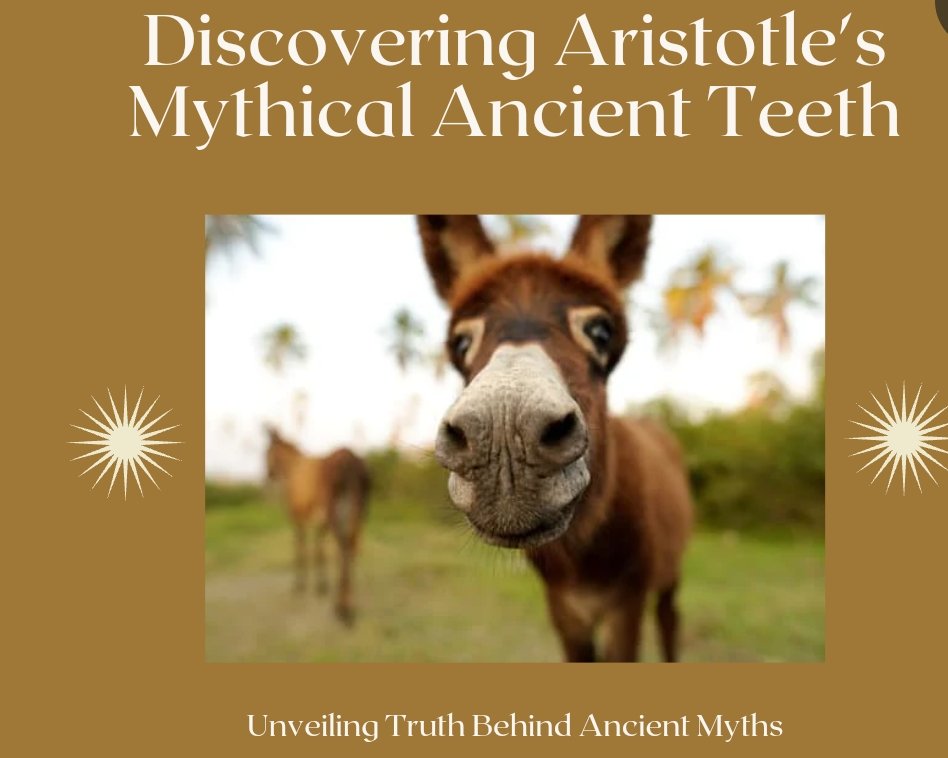When we think of Aristotle, we often associate him with towering achievements in philosophy, logic, biology, and ethics. But the phrase “Aristotle’s teeth in a donkey jaw” seems out of place in the context of his scholarly legacy. Where did this peculiar association come from, and why does it still captivate us today? To answer these questions, we must dive into the heart of ancient debates about knowledge, truth, and skepticism, along with an exploration of how this phrase became embedded in both popular culture and intellectual history.
The Origin of the Phrase
The exact origin of the phrase “Aristotle’s teeth in a donkey jaw” remains somewhat mysterious, but it appears to be rooted in ancient skepticism about human knowledge, particularly in the realms of biology and science. Aristotle, known as the “Father of Biology,” spent much of his life dissecting and studying animals, carefully documenting their structures, behaviors, and physiology. In his works, he provided detailed observations about the natural world, including the anatomy of animals like horses, cows, and even donkeys.
However, Aristotle’s conclusions, while groundbreaking for his time, were not always free of error. Some of his observations about animal anatomy, particularly concerning the teeth of certain animals, were later proven incorrect. For example, Aristotle stated that men and women had different numbers of teeth, a belief that modern science disproved. This led to a tradition of critical reflection on Aristotle’s work and gave rise to some skepticism about whether one could trust all of his assertions.
The phrase “Aristotle’s teeth in a donkey jaw” could be viewed as a metaphorical statement, reflecting this skepticism. It is as if the teeth of the revered philosopher, a symbol of his vast intellect, are being placed in the jaw of a humble donkey—suggesting that even the great mind of Aristotle could fall victim to error, misinterpretation, or simple ignorance when it came to certain facts.
Aristotle’s Approach to Science and Knowledge
Aristotle’s scientific approach was empirical and grounded in observation, but his tools and resources were limited by the standards of modern science. He lacked access to microscopes, genetic analysis, and the technological advances that shape our understanding of biology today. Still, his observations were highly influential, setting the groundwork for centuries of study in the natural sciences.
In his work “History of Animals,” Aristotle presented meticulous descriptions of various animals, including donkeys. Although his classifications were not always accurate by today’s standards, they demonstrated a rigorous attempt to categorize and understand the diversity of life on Earth. Nevertheless, when some of these observations were later scrutinized, errors were identified, such as incorrect assumptions about teeth, which led to skepticism among his successors.
The Symbolism Behind the Donkey Jaw
Why a donkey, though? Donkeys, throughout history, have been regarded as symbols of humility, simplicity, and even ignorance. The donkey, lacking the majesty of horses or the strength of oxen, was often portrayed as a lowly creature. This symbolism is important when interpreting the phrase “Aristotle’s teeth in a donkey jaw.” The great philosopher’s “teeth”—a metaphor for his wisdom or knowledge—are placed in the mouth of an animal that, in popular imagination, represents ignorance or simplicity. This juxtaposition conveys a deeper, almost ironic critique of intellectual authority.
In some ways, the donkey jaw can also be seen as a reflection of the idea that knowledge, no matter how well-founded, is always incomplete or susceptible to error. Even Aristotle, despite his towering contributions to philosophy and science, could be mistaken or misinterpreted. This duality of wisdom and ignorance, represented by the donkey jaw, serves as a cautionary tale for those who place unquestioning faith in authority or tradition.
The Impact of Skepticism on Ancient and Modern Science
The phrase “Aristotle’s teeth in a donkey jaw” reminds us of the enduring importance of skepticism in science and philosophy. The ancient Greeks were no strangers to skepticism; figures such as Pyrrho and Sextus Empiricus questioned whether humans could ever truly know anything with certainty. Aristotle’s own work, though often revered, was subject to scrutiny, and later thinkers like Galileo, Copernicus, and Darwin found many of his conclusions about the natural world lacking.
Aristotle’s errors, particularly concerning animal anatomy, highlight the necessity of continuously questioning and testing established knowledge. Science, by its very nature, is self-correcting, and what we believe to be true today may be proven false tomorrow. The symbolic representation of “Aristotle’s teeth in a donkey jaw” serves as a reminder of this ongoing process of inquiry, correction, and refinement of ideas.
In modern times, skepticism remains a driving force behind scientific progress. The questioning of established truths is not a denial of knowledge but an acknowledgment that knowledge is ever-evolving. From climate science to genetic research, modern scientists stand on the shoulders of giants like Aristotle, but they also recognize that even these giants made mistakes and faced limitations.
Conclusion: The Legacy of Aristotle’s Teeth in a Donkey Jaw
The phrase “Aristotle’s teeth in a donkey jaw” is a powerful metaphor that transcends time, reminding us of the limits of human knowledge. It symbolizes the duality of wisdom and ignorance, the tension between authority and skepticism, and the ever-present need to question, learn, and grow. While Aristotle’s contributions to science and philosophy are undeniably monumental, this phrase reflects the humility that even the greatest minds must possess—acknowledging that they, too, can be mistaken.
In today’s world, where the pursuit of truth is as relevant as ever, “Aristotle’s teeth in a donkey jaw” continues to serve as a symbol of intellectual humility and the importance of skepticism. Whether in philosophy, science, or everyday life, we must recognize that the truth is often complex, and even the most celebrated thinkers are subject to the limitations of their time and circumstances.








